Deep Focus: Bridge of Spies
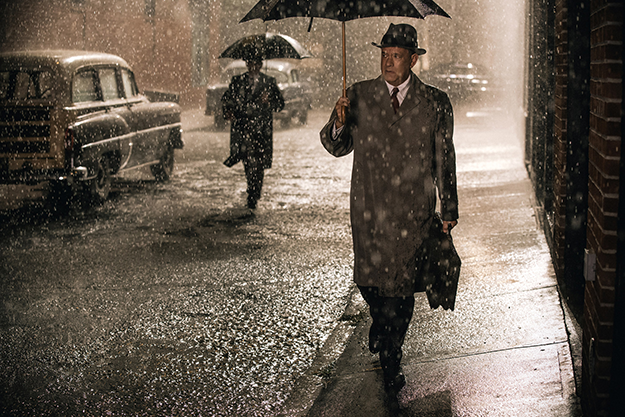
You’d never know from watching Bridge of Spies that its hero, James B. Donovan, was a commander in Naval Intelligence during World War II, and as general counsel to America’s wartime spy service, the Office of Strategic Services (OSS), helped frame guidelines for the creation of the CIA. As the associate to the chief American prosecutor at the Nuremberg trials, he was responsible for collecting a visual record of Nazi genocide and presenting it as evidence. After the war he established himself in New York’s legal community as a specialist in insurance law. In 1957, when the Brooklyn Bar Association requested that he defend Soviet secret agent Colonel Rudolf Abel against three conspiracy charges, it was because of his familiarity with espionage, not mere damage claims.
Donovan, who was vice president (and then president) of New York’s Board of Education and, later, a Democratic candidate for the U.S. Senate, returns to the public eye in the snuffling, rumpled figure of Tom Hanks, as an ingratiating champion of American justice. In this handsome, awkward, and attenuated Steven Spielberg movie, Hanks and Mark Rylance, who does some masterly underplaying as the slight, recessive Col. Abel, cut a tragicomic Mutt-and-Jeff profile while out-thinking everyone else in the picture. The movie contains one reference to Nuremberg but never spells out what Donovan did there, and it elides his history with the OSS and his spadework for the CIA.
Spielberg and Hanks must consider it daring to introduce Donovan as a canny, confident lawyer arguing on behalf of an insurance company that one car slamming into five motorcycles constitutes a single accident. But with hail-fellow-well-met charm, Donovan contends that the insurance industry will thrive only if it can limit liability, and many viewers will embrace him as a tough negotiator. Once he hits his stride as Abel’s sole defender, he stands exclusively for American legal idealism: on U.S. soil everyone, including a Soviet spy, deserves the protections guaranteed in the Constitution.
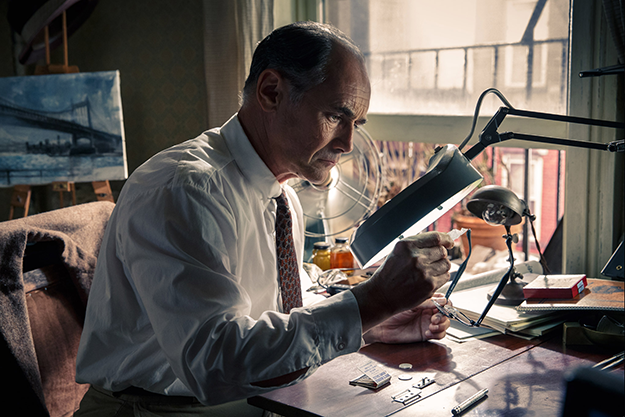
Spielberg and the screenwriters, Matt Charman and Joel and Ethan Coen, don’t want to sully him with experience in realpolitik. So of course the OSS and CIA credentials had to go: they would have made Donovan less of an Everyman. What’s left is a pure-hearted, clear-headed patriot bucking the Cold War prejudices that infect even salt-of-the-earth New Yorkers with jingoism and paranoia. He carries only his native wiliness and decency with him when he enters volatile Berlin to negotiate swapping Abel for one—maybe two—Americans: U-2 spy-plane pilot Francis Gary Powers (Austin Stowell), the man the government desperately wants back in the U.S.; and perhaps also innocent graduate student Frederic Pryor (Will Rogers), who becomes our hero’s personal cause. Donovan practices law in New York City, but he comes off as the international equivalent of a cagy country lawyer. He uses his finely honed BS-detector to cut through both Soviet and East German obfuscations, and his insurance-lawyer shrewdness to work out the two deals. (The one time the real Donovan felt like “the old-time country lawyer returning from a trial at the county seat” was when nine friends from New York accompanied him to and from Washington, D.C., where he argued for Abel before the Supreme Court.)
Whenever they collaborate on a movie (this is the fourth time), Spielberg and Hanks say they play to their strengths, but by now they have succumbed to their weaknesses: they bring out the sentimentalist in each other. Working for a fresh director, Paul Greengrass, in the title role of Captain Phillips (13), Hanks was sensational, conveying the sweat and the skill that go into being a seaman and the spine it takes to be a leader. We never forgot that Phillips was a family man, but it sharpened and motivated him, rather than weigh him down.
In Bridge of Spies, Hanks is playing the wet-eyed, put-upon dad even when he’s with Rylance’s droll Abel. Don’t get me wrong: Hanks is a formidable performer. Despite the huge scale of this production, he never gets lost—he’s always “present.” But without the ruthless specificity of a Greengrass, he drifts into “mood acting,” with a default expression so contorted that he seems backed-up, emotionally and intestinally.
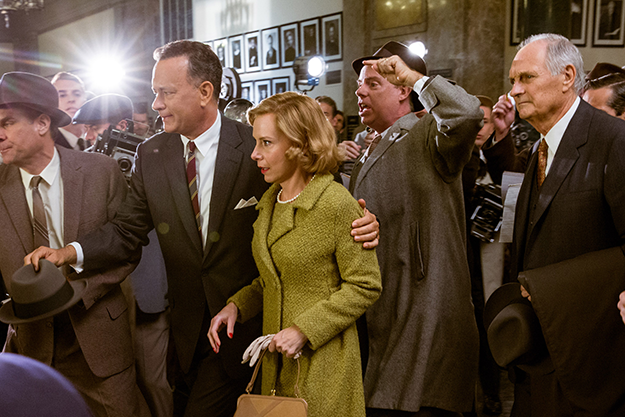
As he did in Munich (05), Spielberg broadens and coarsens a fascinating tale into an overbearingly obvious and preachy statement on the cruelty of political divisions (and borders) and the importance of preserving humane values. Even more than a character, Hanks plays the righteous Daddy of Us All. Under Spielberg’s direction, Hanks can’t do anything so humble as particularize Donovan’s emotions. When Donovan witnesses innocent Germans getting killed while trying to cross from East to West Berlin, he must register enough anguish to satisfy entire aggrieved nations. When a female subway-rider, who glowers at him for defending a Soviet agent, later smiles at him for arranging a civilized solution to the plight of U.S. and Russian spies, his quiet satisfaction lets a smidgen of smugness slip out.
In the arc of the movie, this fictionalized Donovan not only proves the wisdom of his choices to his disapproving wife, Mary (Amy Ryan), and their A-bomb-obsessed kids, but he also catalyzes a shift toward sanity and tolerance in the greater family of America, as represented by the Greek chorus of New York City subway-riders. Partly because of Spielberg’s determination that audiences get the right messages and feel the proper feelings, Bridge of Spies, despite tense and witty passages, is misshapen, over-long, and cripplingly erratic.
The movie splits into two big, clumsy blocks. The first juxtaposes Donovan’s defense of Abel and Powers’s training as a U-2 pilot. This section contains one or two stunning scenes, notably when the FBI tails Abel and then swoops in on his hotel room while he’s shaving in his underwear. But the intercutting between Abel and Powers is as unsurprising and steady as a metronome. Some parallels can be colorful: Abel uses a hollowed-out nickel to pass coded messages, while the CIA gives pilots a hollowed-out silver dollar containing a poison pin. But you feel like crying out: “I get it already—both sides used spies.” Astonishingly, Bridge of Spies barely touches on the trial proceedings. Donovan conducts his legal-eagling mostly in the chambers (and home) of the unabashedly conservative Judge Byers (Dakin Matthews). Even Byers proves sensible enough to realize that a Soviet agent given jail time is more exploitable for America than one sentenced to execution.
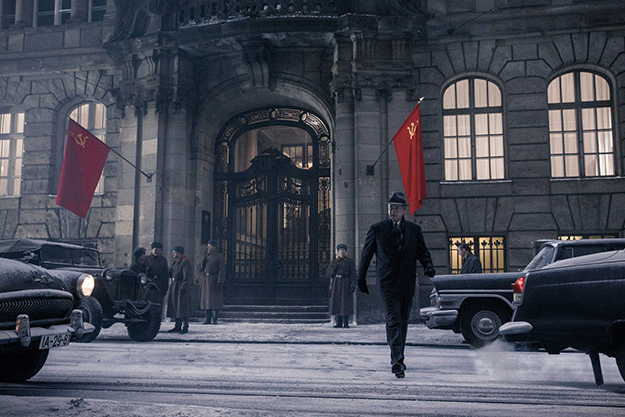
The depiction of Donovan’s family life resembles a 1950s issue of Family Circle magazine. When she isn’t setting TV dinners down in front of her kids as they gape at the boob tube, Mary fixes them meat loaf and mixed vegetables. Their teenage daughter moans about being stood up, until Donovan’s wholesome young associate arrives to help with the Abel case. Later she lounges in her curlers watching 77 Sunset Strip until bullets from anti-Soviet loonies interrupt the program and temporarily disrupt the Donovans’ patch of Eisenhower-era Eden. This crude invented episode betrays Spielberg’s own confusion of nostalgia and revisionism. When the girl’s little brother becomes a precocious expert on nuclear fallout, Donovan assures the lad that Abel wasn’t smuggling atomic-energy secrets. How does he know? Is this meant to play as a white lie?
In the better second section, Donovan enters the schizophrenic Germany of 1962, when the mortar is still wet on the Berlin Wall. Spielberg trenchantly evokes the craziness of a divided city: a West Berlin strewn with patches of Western luxury, an East Berlin left in poverty and ruins. Hewing close to the historical record (in this case), Spielberg cooks up a spiky political stew from East Germany striving for recognition from the United States, the Soviet Union coolly maintaining dominance over its satellite state, and the two superpowers playing chess, and sometimes chicken, as they maneuver to win back their spies before they leak any secrets.
The moviemakers heighten real-life episodes into ominous vignettes. Instead of brazening his way through a gang of East Berlin hooligans, Donovan exchanges his Saks 5th Avenue overcoat for directions to the Soviet Embassy. Spielberg pulls off most of these mini-melodramas with sardonic humor and brio. He exhibits a deft touch with his European ensemble, led by Sebastian Koch (The Lives of Others, Homeland) as the slippery East German lawyer Vogel and Mikhail Gorevoy as the smart, dissembling Soviet negotiator Schischkin.
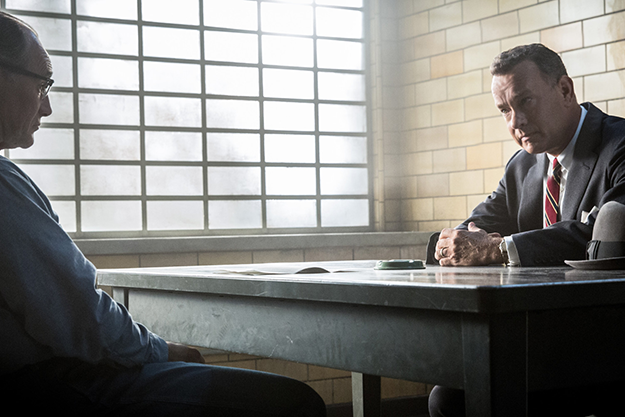
But when Donovan catches a cold that nags at him throughout the trip, Hanks, and Spielberg, go overboard with the nose-wiping and wheezing. “I had developed a cold which settled in my back; it felt like pleurisy,” Donovan writes in the crisp tones of his surprisingly jaunty book, Strangers on a Bridge: The Case of Colonel Abel and Francis Gary Powers (reissued as a movie tie-in). His back pain prompted a change of venue for a rendezvous, but as a writer—and a negotiator—Donovan doesn’t use it as a comical leitmotif, the way Hanks uses his sniffles while complaining that he just wants to go home and go to bed. If Spielberg and Hanks were hoping for a simultaneously comic and strategic effect, à la Peter Falk’s Columbo, their timing is way off.
It’s a relief to open the book’s pages and discover, for example, that his wife and family cracked jokes about the case — they composed a ditty about Rudolf Abel to the tune of “Rudolph, the Red-Nosed Reindeer” — and were mostly concerned about crank phone calls and schoolyard jibes; his son even accompanied him when he visited Abel behind bars. The book’s matter-of-fact marshaling of details is brain-clearing and engrossing. (Documentary-maker Alex Gibney’s father, Frank Gibney, also a veteran of Naval Intelligence, makes a guest appearance as a senior editor at Life with a theory about the coding of some of Abel’s letters.)
Mary Donovan’s major complaint was that her husband gave “more time to Abel than to our family. She, of course, was right. I told her that she was not ‘on trial’ but the moment she became a defendant charged with a capital crime I would immediately reverse the division of my time. She asked me how I could do that if I were the victim of her capital crime.” (An apparent workaholic before the condition had a name, Donovan died tragically young, at 53, in 1970.)
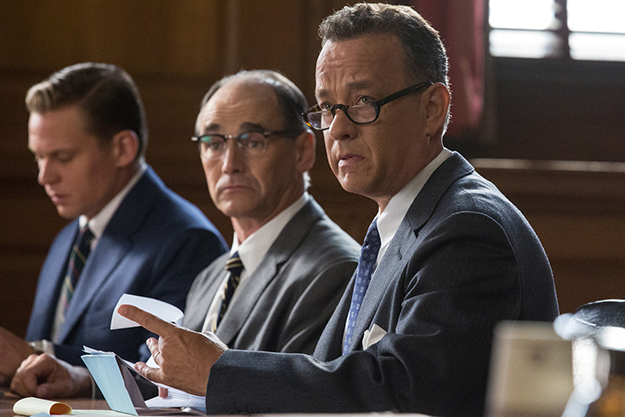
Incisive, authentic interchanges like that would have grounded Bridge of Spies in a genuine emotional reality. So would a keener and savvier profile for Donovan’s movie character. But Spielberg and Hanks no longer hone each other’s best cinematic reflexes. They prod each other into even greater pseudo-innocence and forced, excessive sentiment. Their mawkishness seems to double when they’re in each other’s sight.
During a gripping prisoner exchange at Berlin’s Glienicke Bridge, we’re supposed to believe that Donovan would be shocked to see snipers on either side. Like too much of the movie, that naïve touch, and the feel-good choreography of Donovan’s subsequent homecoming, presents viewers with an insurmountable span to cross: the suspension bridge of disbelief.



